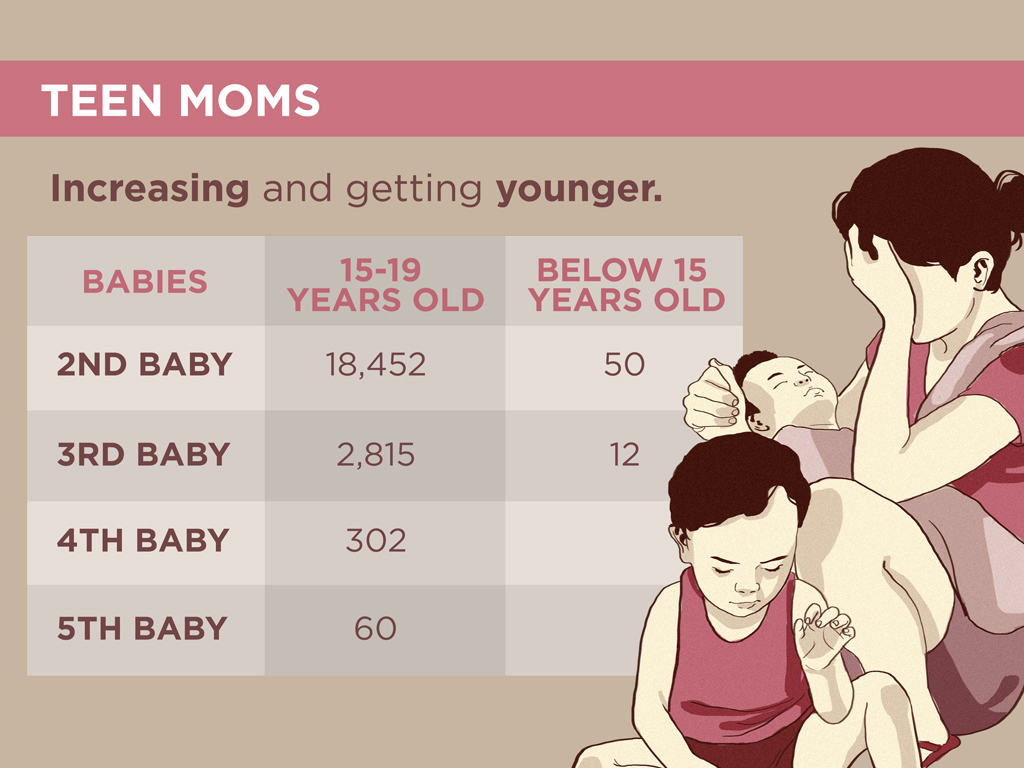The Philippines has one of the highest teen pregnancy rates in the world. Every hour, 24 babies are born to teenage mothers; that’s 500 every day.
And many teenagers are having more than one child before they even reach their twenties. Data from the Philippine Statistics Authority has found more than 18,000 girls between the ages of 15 and 19 have had a second child. In light of these facts, as well as a temporary restraining order issued by the Supreme Court on the distribution of certain contraceptives, Women & Girls hosted a live discussion in collaboration with Rappler featuring three experts on family planning.
Reporter Ana P. Santos spoke with Dr. Emma Llanto of the Society of Adolescent Medicine of the Philippines, Marla Darwin, cofounder of the feminist collective Grrrl Gang Manila, and Hope Basiao-Abella, adolescent reproductive health project coordinator at Likhaan Center for Women’s Health.
Here are a few edited highlights from the conversation, which addressed both the reasons why teen pregnancy is so common in the Philippines, and what can be done about it.
Dr. Emma Llanto: I work in a government hospital. Most of the time the girls [there] are 16, 17, 18, although we have [seen] some increase in the younger age group. Most of the time, these girls do not have any idea how their bodies work, how to protect themselves, how to talk to their partners about negotiating to use condoms or contraception, or have absolutely no idea what “contraceptives” even mean.
Abstinence is the first message, but we know we need to teach them something else. The evidence [shows that] what will prevent a subsequent, rapid-repeat pregnancy is the use of a long-acting, reversible contraceptive. In terms of medical eligibility it’s safe and effective, and really is suited for adolescents, because you can’t expect a young girl to remember to take pills every day.
And so imagine, you have three years [when] you don’t have a baby. That’s enough time for you to get your act together, to take care of your baby, to breastfeed, to go back to school, maybe get a job. That changes everything.

Hope Basiao-Abella: Young people say they did not realize that family planning is for those who do not have families. They did not realize that family planning could also be for them, because they only thought that it was for those who had families already.
Children do not know what they need to look for, they do not see that this is a medical issue, that teenage pregnancy is something that they need to address, that this is something that they need to do. We don’t have available sex education – you don’t get it from schools. We’re raised in a culture where parents are really afraid to broach the topic to their kids.
For example, when [teenagers] are asked, “At what age do you think young people should be in a relationship?” their answer is 25 years old. And then they say, “But of course in reality, we know that a lot of our friends are getting pregnant at 13 years old.” So none of them plans on getting pregnant.
Marla Darwin: The girls in our group [Grrrl Gang Manila] say it’s mostly the blind leading the blind. You ask your friends and you get information that’s hearsay.
If they want to learn about contraception, they hear a lot of urban legends: Maybe if you jump after sexual activity, you’re okay. If you douche with vinegar, you’ll be fine. They say they have a vague idea that birth is painful. They assume the guys will stick around because there will be a moral obligation.
I deal with girls who are in a higher income strata, so they have access to the internet. If these girls feel the need to Google their problems and get their answers from there, it still shows that there’s so much shame. They need to find places where nobody will know who they are, there has to be anonymity, just so that they get access to the information that they need.

Across all income strata, contraception is the woman’s burden. That’s what we get from the stories from our groups, how it always feels like it’s their problem. Their partners are so hands-free with this. And they don’t know basic information. They’ll insist on having sex with their partner while she’s on her period because they’ll say, “You won’t get pregnant, right?”
View the full conversation here:
After the discussion, we also spoke with Dr. Jigs Danila, head of the Women and Men’s Health Development Division at the Philippine Department of Health:
Dr. Jigs Danila
Some parents, when their kids ask them, “Where did I come from?” they will answer, “You came from my heart.” Well, that is not anatomically correct.
The DOH, the department of social welfare, the department of education and the Commission on Population have started an initiative to educate parents in the rural areas [about sex] through community town halls. This is the counterpart to the comprehensive sexuality education that teenagers should receive. For many parents, it’s an awakening for them, they didn’t know enough. We are concentrating this effort in pilot rural areas where there is the highest unmet need for contraception but plan to roll it out nationwide.
Teen pregnancy is a failure of the whole system: the community, the family, the individual and the government.
Under the [Reproductive Health] law, the DOH cannot give out contraceptives to minors without parental consent. What we can do is reach out to teens by giving parents sexuality education.
These excerpts have been edited for length and clarity.
